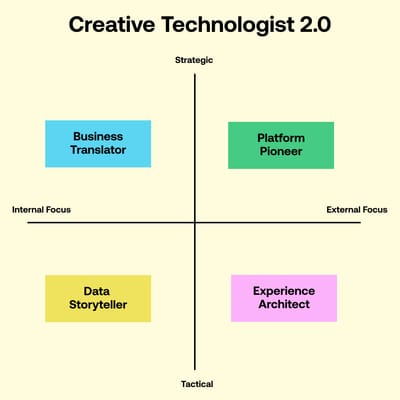Making it in America: What international founders & creatives actually need to know

In 2017, I moved to America. I'd already worked with American companies for over a decade - representing US artists for European touring, running the EU office of an NYC ad tech company, navigating countless transatlantic business relationships. I thought I understood US culture pretty well. Turned out I was wrong.
What I found wasn't just a different business environment. It was a completely different operating system for human relationships, wrapped in familiar English words that meant entirely different things. Same phrases, totally different meanings. Same business concepts, completely different execution.
First, a quick intro. I'm Howard, originally from the UK and founder of Wavetable. Over the past ten years, I’ve built accelerator programs for US entrepreneurs, served on SXSW’s advisory panel, and certified as a coach, often working with international founders and creative professionals navigating these transitions.
But back in 2017, I didn't understand any of this. It took me years to understand what was actually happening - and why it felt so disorienting.
Looking back, I can distill this confusion into two key realizations.
I hope sharing them - and the framework that follows - helps others navigate these waters with less trial and error than I experienced.
Two key realizations
Here are the two key realizations that changed how I understand American business culture - and helped me navigate it more effectively:
1) American business culture operates on paradoxes
It's not simply that Americans do things differently - it's that American culture contains internal contradictions that create genuine confusion. It simultaneously demands authenticity and performance, celebrates innovation while preferring proven models, promotes meritocracy while running complex credentialing systems. These aren't cultural failures - they're features that serve specific functions in a continental-scale economy.
2) It's not just business adaptation - it's identity evolution
Corporate employees can learn American business behavior while largely maintaining their personal identity. But when you're a founder - especially one in the creative industries - more than likely YOU are the brand. Your personality, values, and cultural approach ARE your business model. This means American cultural adaptation asks you to optimize core aspects of your identity, creating some challenges that can be tough to navigate.
These dynamics exist elsewhere, but America amplifies them. The scale of the opportunity, the speed of business, and the emphasis on individual performance as part of your business model make the identity challenge particularly intense here. You can't gradually adapt - the market demands you show up authentically optimized from day one.
Understanding these two realities - the paradoxes and the identity challenge - explains why international founders can struggle in ways that seem irrational from the outside. You're not failing to adapt; you're navigating genuinely complex cultural contradictions while protecting essential aspects of who you are.
This guide breaks down these specific contradictions, why they exist, and how to navigate them without losing your mind. I'll also explore what this means for your identity as an international founder or independent creative professional - the part most guides ignore entirely.
Who this guide is for
Before we dive in, let me be clear about who this guide will help most.
This is for:
- International founders expanding to US markets
- Creative professionals (artists, designers, musicians) building American audiences
- European entrepreneurs navigating US business culture
- American executives working with international talent or considering global expansion
- Startup advisors helping international clients enter the US
- Anyone feeling confused by American business contradictions despite previous success
It isn't for:
- People seeking employment rather than building businesses
- Those looking for visa/legal/tax advice
- Anyone expecting a quick cultural checklist
A few important notes
- My direct experience comes from building service businesses in New York City's creative industries. American business culture varies dramatically by region and industry. Your experience will vary significantly based on location, sector, and cultural starting point. [^ American business culture varies dramatically by region and industry. Southern hospitality operates differently than Midwest pragmatism or West Coast tech culture. These patterns emerged from specific historical forces: frontier capitalism requiring rapid resource mobilization, successive immigration waves necessitating quick social coordination mechanisms, and a federal system demanding standardized business practices across vast geographic and cultural differences. The ideas in this guide apply most clearly to college-educated, coastal business culture - your experience in Dallas oil & gas or Midwest manufacturing may differ significantly]
- I'm British, and I use 'European' a lot in this piece to contrast with American patterns. Obviously Spain and Serbia operate pretty differently, but I've observed common cultural patterns from spending extensive time across Europe - and frankly, even after Brexit I still consider myself European. These dynamics likely apply to founders from other international markets too, though I'm writing from my specific experience and cultural background. [^ This perspective reflects someone with - all else being equal - a decent amount of cultural and economic capital. Working-class immigrants, non-native English speakers, women, and people of color face entirely different dynamics around cultural adaptation. Research shows that successful bicultural adaptation requires maintaining core values while developing new ways of operating. The psychological costs of constantly switching between cultural modes are well-documented, particularly for those without choice about the process.]
- I'm not anti-American - I chose to build my life here and my son is growing up here. This is cultural anthropology, not personal criticism - patterns I've observed, not judgments about people.
- I rewrote this piece several times. One version swayed way too British; the next went more cross-European; the one after that was much more palatable to American audiences - and on and on. I even wrote this final version in US English :) The fact I ended up going through this process proves the exact point I'm making - riding that deep tension between being genuine and being successful.[^I usually ask friends to review drafts of my longer pieces, but this time felt different - and more risky. For some reason, I felt this had to come purely from my own experience, pushing myself to figure it out without outside input. Writing this was quite the learning process - it started from deep frustration around one of these paradoxes (which I didn't even know were paradoxes then).]
- This perspective reflects someone with cultural and economic privilege. Others face different and often harder dynamics around cultural adaptation, usually without choice about the process. This guide is for international founders and creative professionals with some luxury of choice about how and when to adapt.
Ok, disclaimers out of the way. Now let's dig into the cultural contradictions that create so much confusion - and how to navigate them...
The Seven Paradoxes
For a long time, I was constantly confused by American business culture. People said one thing and did another. Systems worked brilliantly and terribly at the same time.
Then the penny dropped: I wasn't experiencing inconsistencies. I was experiencing paradoxes. American business culture is built on fundamental contradictions that create both its incredible energy and its mind-bending confusion. These aren't accidents - they're features.
The seven paradoxes are:
- Meritocracy - "Anyone can make it" operates alongside sophisticated gatekeeping
- Scale - "Start small" culture obsessed with massive markets
- Community - Building relationships that function as strategic networks
- Authenticity - "Be yourself" within optimized performance templates
- Innovation - Disruptive thinking applied to proven business models
- Relationships - Deep connections maintained at opportunity-focused breadth
- Feedback - Direct communication sensitive to systematic critique
(writing these out felt like I'm naming them as the seven deadly sins. lols). [^Even writing this piece proves the point - I spent several hours debating whether 'cross-cultural' makes me sound like a DEI consultant, and whether mentioning Protestant work ethic will offend someone. The cultural adaptation anxiety never stops.]
The cost of not understanding these paradoxes? It can be brutal.
I've watched brilliant founders and creatives spend years getting crushed by forces they can't see - watching their track records get dismissed, their authentic communication creates uncomfortable silences, their profitable business models get questioned as 'limited scope.' They burn through savings, second-guess their abilities, and often give up on markets that could have been perfect for them. They're not necessarily failing - they're fighting a game where nobody explained the rules.
Once you see these paradoxes as features rather than bugs you can navigate them. The same contradictions that make America confusing also make it uniquely powerful for certain opportunities.
Paradox #1: Meritocracy
- They say: "Anyone can make it in America through hard work and talent!"
- They mean: "Success is merit-based, but we use familiar credentialing systems to assess merit quickly."
Aka, The American Dream. The American Dream remains hotly debated, but here’s what I've observed: the US runs complex credentialing systems while telling everyone it's purely merit-based. A significant number of "self-made" entrepreneurs had family money, Ivy League connections, or had senior roles at recognizable brands first.
Your brilliant track record at smaller European companies? It often gets overlooked because in a massive American market, decision-makers look to familiar American reference points first.
Once you step back, it makes sense. In a country of 330 million people with massive regional differences, pure meritocracy becomes impossible to implement fairly. Instead, America developed complex credentialing systems for rapid assessment.
The "anyone can make it" story also serves a purpose - it keeps people optimistic and society functioning, even when the actual numbers don't support it. There's also this deeper cultural thing - what academics call the 'Protestant work ethic' - where success feels like moral validation rather than just professional achievement. This explains why failure in America feels morally threatening, not just professionally disappointing.[^ Max Weber identified how Protestant beliefs about predestination created the success-as-salvation mindset that still shapes American business culture. This explains why failure feels morally threatening rather than just professionally disappointing. I didn't know a ton about this tbh - learned about it while writing this piece. Going to explore further.] (I had no idea this was a thing until writing this piece - suddenly so much made sense...)
- You know this is affecting you when: Your impressive achievements in your home / previous country get politely dismissed or ignored because they don't fit American success templates, or when you notice credentials mattering more than actual results.
- The navigation: Frame your achievements in American success metrics. That 15-person team becomes "grew revenue 300% over 3 years serving 5,000 customers." Your boutique European clients become "worked with category-leading brands in competitive markets." Reverse-engineer your story into US templates.
Paradox #2: Scale
- They say: "Start small and grow organically!"
- They mean: "Everything must be scalable to massive markets immediately."
Venture capital thinking has permeated American business culture far beyond actual startups. From reality TV shows like The Apprentice to mainstream business media, the assumption is that any business worth doing should be capable of serving millions of customers. Your sustainable, relationship-based approach can get questioned as limited, even when it's more profitable or effective than optimization-obsessed alternatives.
Time pressure amplifies this: Americans compress business timelines in ways that can catch international founders off-guard. The pressure isn't just about serving millions of customers - it's about getting there fast. It’s "How do we scale this quickly?" versus "How do we build this sustainably?"
And it's not just about speed - it's about measurable speed.
The metrics obsession can be equally pervasive. America wants ROI calculations for... well, almost everything: marketing campaigns, employee training, even personal decisions (this may be why the self-help business is so big here). Your approach of "it's working well" needs translation into "it's generating 120% ROI with strong retention metrics." This isn't superficiality - it's how decisions get made when subjective judgment can't scale to 330 million people.
- You know this is affecting you when: Your profitable, sustainable business model gets questioned as limited despite strong results, or when you notice pressure to frame everything in growth terminology.
- The navigation: Lead conversations with growth potential, even for sustainable businesses. Instead of "We're profitable and stable," try "We've proven product-market fit in our initial market and see clear expansion opportunities." Same business, scalable framing.
Paradox #3: Community
- They say: "We're building community and lifting each other up!"
- They mean: "We're building networks that create mutual opportunities."
American professional communities excel at celebration and connection but operate on different assumptions about reciprocal support. The same peers and colleagues who enthusiastically amplify your wins may become unavailable when you need assistance - not from malice, but because American professional relationships are typically optimized for opportunity creation rather than interdependent support.
This isn't worse than other approaches - it's different. American networking helps you access opportunities and resources you'd never reach through deeper, smaller circles. But expecting European-style mutual aid from American professional communities creates confusion on both sides.
Professional communities become audiences for success stories rather than safety nets for difficult periods. The "vulnerability" that works is retrospective - sharing challenges you've overcome with clear lessons learned, not current struggles you're navigating.
- You know this is affecting you when: You share actual struggles in professional communities and get polite silence instead of support, or when you notice that "community building" events feel more like mutual promotion than mutual aid.
- The navigation: Treat professional communities as opportunity networks, not support systems. Share wins and lessons learned, not current struggles. Build your actual support network through deeper, smaller relationships outside these professional circles.
This performance of community connects to a broader pattern around authenticity.
Paradox #4: Authenticity
- They say: "Just be yourself and stay authentic!"
- They mean: "Be the optimized version of yourself that fits our templates."
American social performance norms operate differently than European ones. Where British culture performs politeness to maintain distance and preserve dignity, American culture performs enthusiasm to create connection and manage complexity.
The American version of "authenticity" is actually sophisticated personal branding. You're encouraged to be genuine, but only within parameters that serve professional goals.
Your quirks should be charming, your struggles should have clear resolutions, your personality should be "on brand."
This extends beyond just sharing struggles - even humor gets calibrated differently. While British professionals might use casual banter or self-deprecating jokes to build rapport in meetings, American business culture tends toward more buttoned-up professionalism. Your attempt at light humor might land as unprofessional rather than relationship-building. (I wrestle with this one a LOT. I just can’t help myself…). Even tiny things shift - an Irish friend told me that the concept of being 'bold' reads as rude in Ireland, but means leadership in the US; casual swearing that's normal(ish...) in UK business feels unprofessional in America's more virtue-focused professional culture.
American business culture also tends to separate emotional processing from professional interactions. Genuine feelings are for therapists; professional interactions require optimized emotional presentation. This creates a specific type of vulnerability: sharing challenges you've overcome with clear lessons learned, not current struggles you're navigating.
This connects to broader cultural patterns around struggle and redemption - including in humor and comedy. [^Stephen Fry observed that American comedy characters typically find redemption even in disaster, while British characters often remain trapped in their suffering. Even when American characters are pathetic (Larry David, various Jim Carrey characters), they still maintain fundamental dignity and agency. British characters like David Brent or Basil Fawlty invite the audience to mock their core dignity. This reflects deeper cultural attitudes about whether struggle requires hope for redemption - explaining why American business culture demands that shared difficulties come with transformation stories rather than honest acknowledgment of ongoing challenges.]
- You know this paradox is affecting you when: Your honest answers about business challenges make rooms go quiet, or when you find yourself constantly curating your personality for professional consumption. You might answer "How are you?" honestly and watch the conversation get awkward as they expected "Fine, thanks.” (pro tip: in the US, "How are you?" doesn't always come with a question mark attached.)
- The navigation: Think of professional authenticity as personal branding rather than emotional honesty (I know, I know…). Share your genuine personality, but frame it positively. Your struggles become "learning experiences," your quirks become "unique perspectives," your challenges become "growth opportunities."
This might be the trickiest paradox to navigate - which is why I dive deeper into the identity costs in the section below.
Paradox #5: Innovation
- They say: "We love disruptive innovation and thinking outside the box!"
- They mean: "We love proven business models with new technology wrapped around them."
American markets excel at innovation - but it tends to be a very specific type: taking proven concepts and making them accessible to massive markets. While international founders might perfect solutions for sophisticated niches, Americans have mastered the art of scaling concepts to serve millions.
This chasm-crossing specialty creates enormous value, even when the original innovation comes from elsewhere. It's not that Americans can't handle truly novel ideas - there are many generated here - it's that the entire business ecosystem is optimized for rapid adoption at scale. And when you look at tech in particular - but also products from toothpaste to movies - that scale can be gargantuan.
Meanwhile, truly novel ideas often emerge in smaller, more experimental markets - Scandinavian design thinking, Korean beauty innovation, Dutch sustainable technology. American companies often adopt and scale these concepts for global markets, creating enormous value through distribution and execution rather than original invention.
From a business perspective, it makes sense: why risk educating markets about something completely new when you can take something that works and make it work for everyone?
- You know this paradox is affecting you when: Your genuinely innovative solution gets polite interest followed by requests for "comparable companies," or when your best ideas gain traction only after you package them in familiar frameworks.
- The navigation: Lead with the familiar framework, then reveal the innovation. Instead of 'This is completely new,' try 'It's like Uber, but for...' or 'Think Airbnb meets...' Americans want to understand before they get excited.
Paradox #6: Relationships
- They say: "Let's build authentic relationships and support each other!"
- They mean: "Let's develop professional connections that create mutual value."
Americans have developed sophisticated systems for maintaining warm professional relationships at scale - emphasizing breadth over depth in ways that can confuse international founders.
American business networking prioritizes opportunity creation across broad networks, while European business culture (in my experience) emphasizes deeper, interdependent relationships within smaller circles. When people expect to advance rapidly in status and wealth, maintaining hundreds of valuable connections feels more strategic than cultivating dozen deep partnerships.
This also shapes business timelines: Americans prefer to do business first and build relationships through working together, while European cultures expect relationship-building before business discussions.
The confusion comes from mismatched expectations. When someone enthusiastically supports your posts and grabs coffee, international founders interpret this as the beginning of deeper partnership. Americans treat it as successful maintenance of a valuable professional connection.
Midway through my first year, I remember a Saturday brunch with someone in my apartment building. His first question: 'so, are you guys planning on staying in NYC for the long term?'
The networking breadth isn't superficiality - it's adaptation to a mobile, continental-scale economy where your next big break could come from anywhere.
- You know this is affecting you when: Your "warm" professional connections don't develop into deeper partnerships, or you discover that your "quick coffee" has turned into them pitching you when you thought you were just building a relationship. Americans also expect more aggressive follow-up than feels natural.
- The navigation: Follow up more aggressively than feels natural - what seems pushy to Europeans reads as appropriate persistence to Americans. Focus on creating mutual value quickly rather than building rapport slowly. Do business first, deepen relationships through working together.
This focus on broad, opportunity-driven relationships also shapes how Americans approach difficult conversations - including feedback.
Paradox #7: Feedback
- They say: "We value direct feedback and honest communication!"
- They mean: "We value constructive feedback that helps us improve our approach."
American business culture claims to value directness and honest communication while being sensitive to criticism that questions fundamental assumptions. The same culture that celebrates "radical candor" responds differently when that honesty extends to systemic or cultural critique.
This sensitivity often surprises international professionals (myself included - I've accidentally stepped on this landmine more times than I care to admit). Cultural observations that feel neutral to Europeans can land as criticism to Americans. (And yes, being defensive about defensiveness is very American - the irony isn't lost on me.)
Business communication in the US is also subtly shaped by litigation culture - the constant simmering legal risk creates preference for "constructive feedback" over systematic critique. Direct observations about systemic problems can feel legally risky, so Americans default to individual improvement suggestions.
Tactical suggestions about improving specific processes are welcomed enthusiastically. But observations about systemic patterns or cultural dynamics that might be creating those process problems are often received with defensiveness.
- You know this is affecting you when: Your systematic observations get dismissed despite tactical suggestions being welcomed, or when you notice Americans interpreting cultural analysis as personal criticism. Like this article, perhaps... let’s see how much hate mail I get ;)
- The navigation: Focus feedback on specific processes rather than systemic patterns. Instead of 'Your team isn't aligned on priorities,' try 'Could we clarify the decision-making process for this project?' Instead of 'Leadership doesn't communicate well,' try 'Would it help to have more frequent check-ins on project status?' Same insight, more actionable frame.
These paradoxes explain the confusion, but they don't tell the whole story. American business culture has genuine strengths that make navigating these complexities worthwhile.
Before diving into tactics, it's worth acknowledging what American business culture genuinely excels at. These aren't just nice-to-haves - they're the reasons international founders choose to build here despite the cultural complexity.
The American Advantage
American business culture has many genuine strengths. Here are just five of them - and they're significant:
- Resource Mobilization - When Americans decide something matters, they can deploy incredible resources quickly. The network effects, capital availability, and institutional support genuinely exceed most other markets. If you need funding, partnerships, or talent at scale, American systems are built for rapid mobilization. I've watched startups go from idea to Series A funding in 6 months here - something that typically takes 2-3 years in European markets.
- Execution Speed - Decisions happen in weeks rather than months. Americans prefer to move fast and course-correct based on results rather than spending extensive time in planning phases. This creates opportunities for agile businesses to gain market position quickly.
- Reinvention Acceptance - Career pivots, business model changes, and professional rebranding are normalized rather than seen as signs of instability. Americans celebrate the "pivot" - as long as you land in a clear, recognizable category afterward. (Note: this last bit is not to be underestimated - and tough to navigate if you are a generalist/hybrid type)
- Optimism as Strategy - American positive thinking creates self-fulfilling prophecies that generate real opportunities. The cultural assumption that growth and success are normal outcomes helps ambitious projects get funded and supported that more skeptical cultures might dismiss as unrealistic. This is my personal fave - the difference here vs. most of Europe is very noticeable.
- Scale Thinking - The assumption that solutions should work globally pushes entrepreneurs toward bigger markets and more impactful solutions. While this can dismiss perfectly good lifestyle businesses, it also enables businesses that can genuinely help millions of people.
These advantages explain why the adaptation is worth it. But they don't prepare you for some hidden challenges...
The Identity Challenge
Ok, this is where it gets personal. Unlike corporate employees who can compartmentalize cultural differences, founders face a unique dilemma: your personality, values, and cultural approach ARE your business model.
When American culture asks you to optimize your authenticity, communication style, and relationship approach, it's asking you to optimize your core identity. The changes are real and often permanent - you won't return to your pre-America professional self. Yes, me included.
The identity challenge, more than any of the paradoxes, is what I wish someone had explained to me in 2017.
Two dynamics emerge here - both fascinating and challenging:
1) The Identity Process
I’ve observed that Europeans who succeed in America long-term tend to go down one of two paths:
- genuinely become American, adopting the optimism, networking breadth, and scale obsession
- become professional Europeans where they perform their cultural background as a differentiator for American consumption. Think the "sophisticated French designer or "charming British strategist" (there’s a long-running half-joke that every ad agency and consultancy has a ‘smart Brit’ on the strategy team...)
A third path exists - developing hybrid identity that maintains core values while communicating in American cultural language. For me, this is the most exciting and enriching path, but it requires constant conscious effort and frankly can feel exhausting. For what it's worth, I find myself flitting between path two and three...
2) The Psychological Cost
You'll spend years trying to remember who you were before you optimized yourself for American consumption. The culture asks you to stretch in ways that don't always feel natural - performing optimism when you're processing difficulties, emphasizing scale when you think sustainably, celebrating individual wins when you value collective success. It's not that these are wrong, but constantly adapting your instincts takes real energy and conscious effort.
This creates genuine identity dissonance for Europeans raised on authenticity, sustainability, and collective responsibility.
Just before publishing this piece, I met a British creative at a party. Her UK achievements - genuinely impressive ones - got politely ignored by Americans because they don't translate to familiar frameworks. "I get crushed when I think it's not working," she said. "And I keep asking myself - why do I have to become someone else?"
That question captures what most guides miss. You're not just learning new business practices - you're rebuilding fundamental aspects of how you show up in the world.
There's also an ego recalibration that comes with the territory. You've built expertise and credibility that works in your home market. In America, that track record gets politely set aside - not because your work wasn't excellent, but because it doesn't translate to their reference points.
I definitely fell into this trap - spending way too much energy being frustrated that my previous achievements didn't carry weight, instead of just getting on with building new ones. The faster you can acknowledge this reset and focus on what you're building next, the less time you waste spinning your wheels.
What this all means
Whether you're considering this leap, just starting to navigate it, or have been here for years wondering why certain things feel so difficult - these cultural dynamics are worth understanding consciously rather than learning through trial and error.
You'll succeed, but differently than you imagine. Your strengths will translate, just not how you expect.
The cultural adaptation is real and often permanent - I'm not the same person professionally that I was in 2017. But that's expansion, not loss.
The real challenge isn't choosing between authenticity and success - it's figuring out which aspects of yourself to adapt and which to preserve. Some people drift unconsciously into American patterns, others resist everything and struggle unnecessarily. The most sustainable approach is conscious cultural adaptation - understanding what you're changing and why.
These patterns aren't random - they're shaped by capitalism at continental scale. Once you see that, you can work with it instead of fighting it.
The goal isn't to become American (though you're welcome to!) - it's learning to operate in both worlds.
Even writing this guide required the cultural adaptation I'm describing. The first draft was too British, too critical. The second was too academic. The third, fourth, fifth... honestly, I lost count. I hope this version strikes the balance Americans prefer - constructive insight with optimistic framing.
The irony isn't lost on me - and it's exactly why these dynamics matter so much.
These cultural dynamics affect every international founder and creative professional I work with.
If you're navigating transatlantic expansion - whether as a founder, creative, or executive building international teams - I'd love to help. I work with people on exactly these dynamics. I also speak about international business culture at conferences and company events. Schedule a call here >






Member discussion